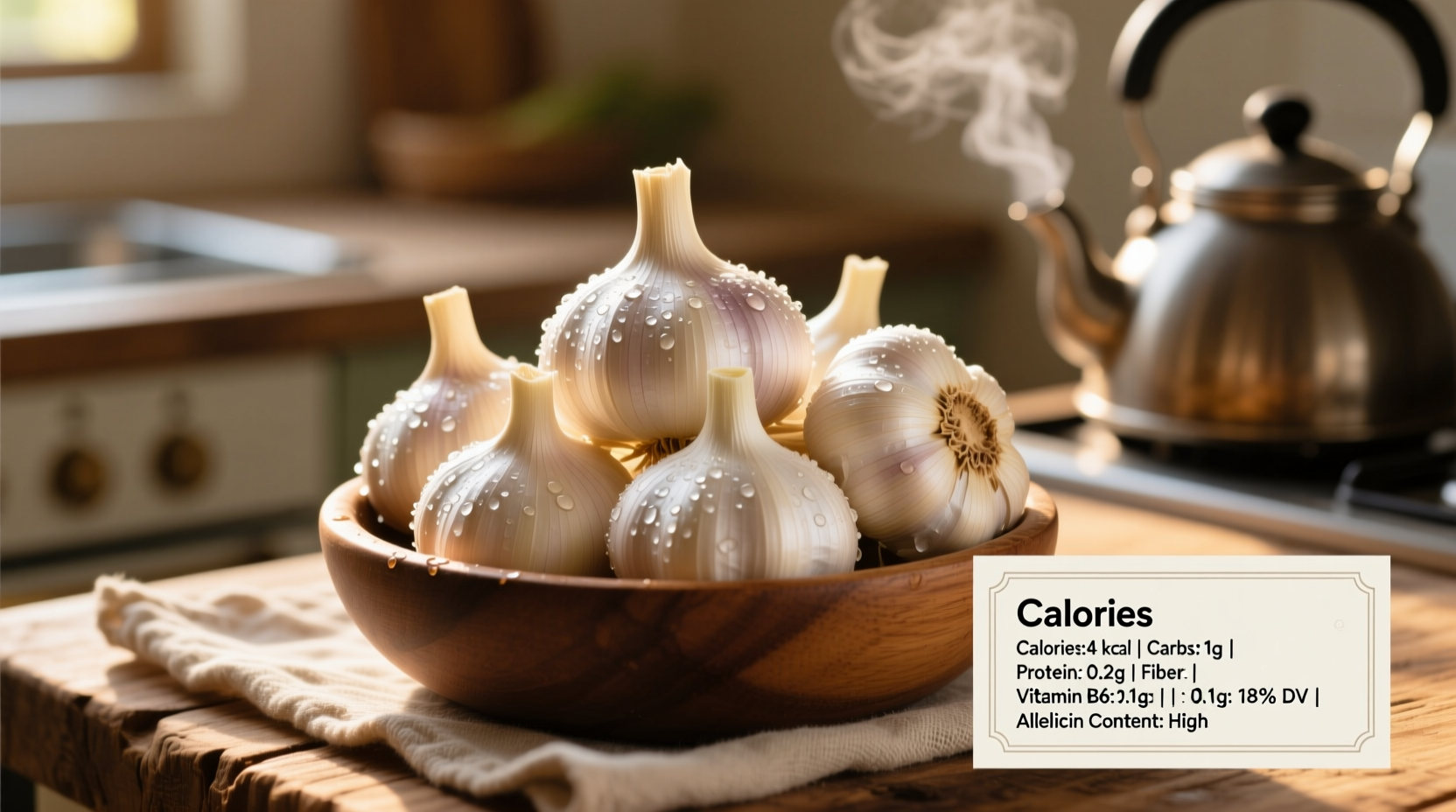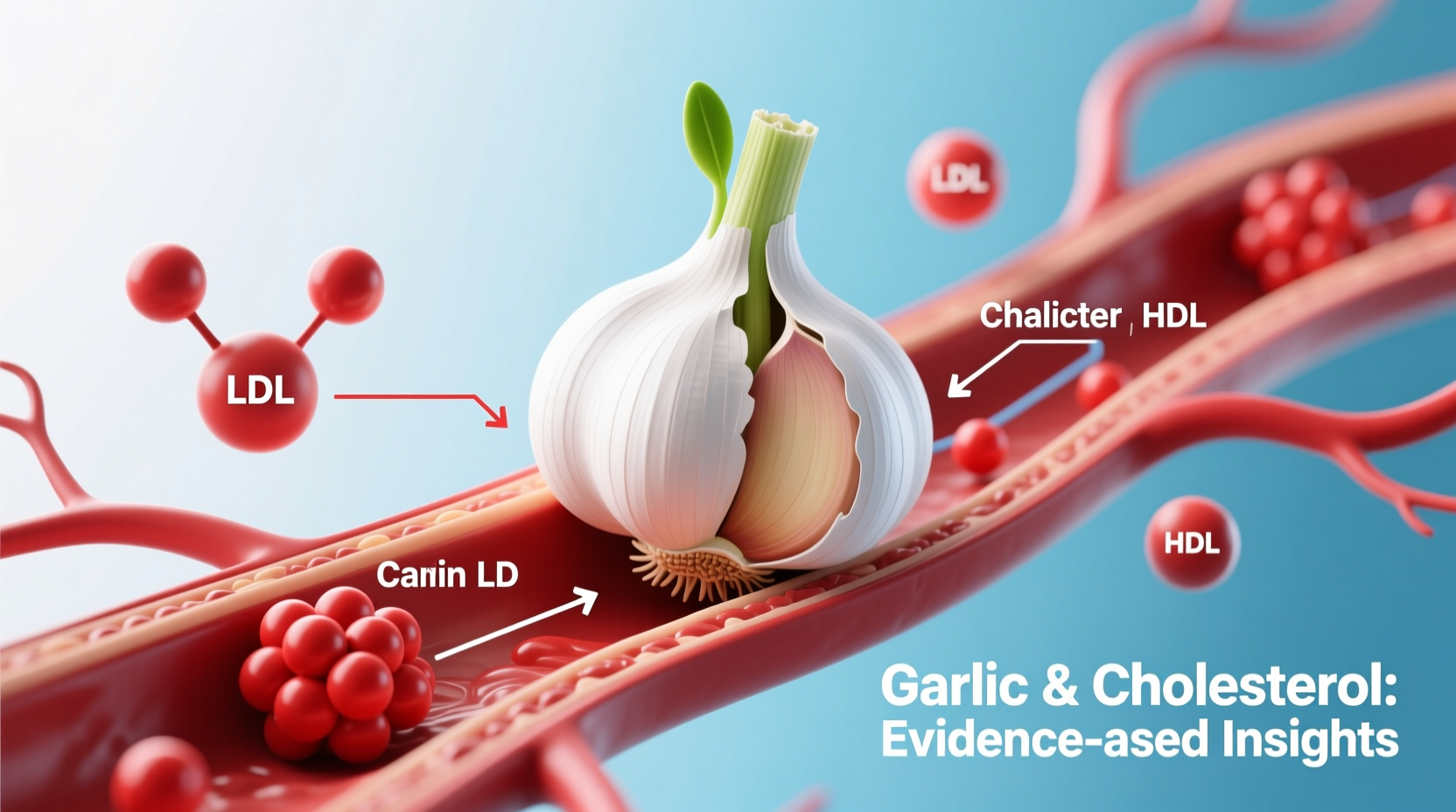For decades, garlic has been celebrated in traditional medicine systems worldwide for its potential cardiovascular benefits. But what does modern science actually say about garlic's impact on cholesterol? Let's examine the evidence without hype or oversimplification.
The Active Compounds Behind Garlic's Potential Benefits
When you crush or chop fresh garlic, an enzyme called alliinase converts alliin into allicin—the compound primarily responsible for garlic's distinctive smell and many of its studied health effects. Allicin then breaks down into other organosulfur compounds that appear to influence cholesterol metabolism.
According to research published in the Journal of Nutrition, these compounds may work through several mechanisms:
- Inhibiting cholesterol synthesis in the liver
- Reducing oxidative stress that contributes to plaque formation
- Modestly improving blood vessel function
- Decreasing the absorption of cholesterol in the digestive tract
What the Scientific Evidence Actually Shows
It's crucial to separate marketing claims from scientific reality. A comprehensive 2020 meta-analysis in Experimental and Therapeutic Medicine reviewed 39 clinical trials involving over 2,300 participants. The findings revealed:
| Study Duration | Average Cholesterol Reduction | Triglyceride Impact | HDL ("Good" Cholesterol) |
|---|---|---|---|
| 8 weeks | 4.6% | No significant change | No significant change |
| 12 weeks | 7.3% | 5.2% reduction | Minor increase (2.1%) |
| 24+ weeks | 9.2% reduction | 8.7% reduction | 3.8% increase |
This timeline demonstrates that garlic's cholesterol effects are modest and require consistent, long-term consumption. The American Heart Association acknowledges these findings but emphasizes that garlic should complement—not replace—proven cholesterol management strategies.
How Much Garlic Do You Actually Need?
Research suggests effective doses vary significantly based on preparation method:
- Fresh garlic: 2-4 cloves daily (approximately 6,000-12,000 mcg of allicin potential)
- Aged garlic extract: 600-1,200 mg daily (standardized to 1.2-2.4 mg S-allylcysteine)
- Garlic powder: 600-900 mg daily (providing 3.6-5.4 mg alliin)
Crucially, how you prepare garlic affects its potency. A study from the National Institutes of Health found that crushing fresh garlic and letting it sit for 10 minutes before cooking preserves more allicin than immediate cooking. Raw consumption provides maximum compounds but may cause digestive discomfort for some.

Realistic Expectations: Where Garlic Fits In
Understanding garlic's limitations is as important as recognizing its benefits. Consider these context boundaries:
- For mild cholesterol elevation: Garlic may provide meaningful support alongside dietary changes
- For moderate elevation: Works best as complementary support to medical treatment
- For high-risk individuals: Insufficient as standalone treatment; requires medical supervision
- Timeframe: Benefits typically emerge after 2-3 months of consistent use
The American Heart Association emphasizes that while garlic shows promise, it delivers significantly smaller cholesterol reductions than statin medications (which typically lower LDL by 30-50%). Think of garlic as one component in a comprehensive approach rather than a magic solution.
Practical Implementation Strategies
Maximize garlic's potential benefits with these evidence-based approaches:
- Optimal preparation: Crush or chop garlic and wait 10 minutes before cooking to activate allicin
- Daily incorporation: Add to salad dressings, roasted vegetables, or tomato sauces
- Consistency matters: Track your consumption to ensure daily intake
- Combine strategically: Pair with other heart-healthy foods like olive oil, leafy greens, and fatty fish
For those who dislike garlic's taste or experience digestive issues, aged garlic extract supplements may provide benefits without the strong flavor or gastrointestinal side effects. Look for products standardized to allicin potential or S-allylcysteine content.
Important Considerations and Limitations
Garlic isn't appropriate for everyone. Consider these factors:
- Medication interactions: May enhance blood-thinning medications like warfarin
- Surgery considerations: Discontinue 7-10 days before scheduled procedures
- Digestive sensitivity: Raw garlic may cause heartburn or upset stomach
- Realistic outcomes: Don't expect dramatic cholesterol reductions without comprehensive lifestyle changes
Individual responses vary significantly based on genetics, baseline cholesterol levels, and overall diet quality. The most significant benefits appear in individuals with initially elevated cholesterol levels who maintain consistent consumption over several months.
Creating a Comprehensive Cholesterol Management Plan
Garlic works best as part of a multifaceted approach. Combine it with these evidence-based strategies:
- Replace saturated fats with unsaturated fats (olive oil, avocados, nuts)
- Incorporate soluble fiber (oats, beans, apples) which can lower LDL by 5-10%
- Include plant sterols (2g daily) which can reduce LDL by 7-10%
- Maintain regular physical activity (150 minutes weekly)
- Manage stress through proven techniques like meditation or deep breathing
Remember that no single food can overcome an otherwise unhealthy diet. The Mediterranean diet pattern—which naturally includes garlic—demonstrates significantly better cholesterol outcomes than isolated garlic supplementation.
When to Consult a Healthcare Professional
While garlic is generally safe for most adults, consult your doctor if:
- Your total cholesterol remains above 240 mg/dL despite lifestyle changes
- You're taking blood-thinning medications
- You have a family history of early heart disease
- You're considering garlic supplements alongside prescribed cholesterol medication
Regular cholesterol testing every 4-6 months can help determine whether your approach—including garlic—is effectively managing your levels.











 浙公网安备
33010002000092号
浙公网安备
33010002000092号 浙B2-20120091-4
浙B2-20120091-4